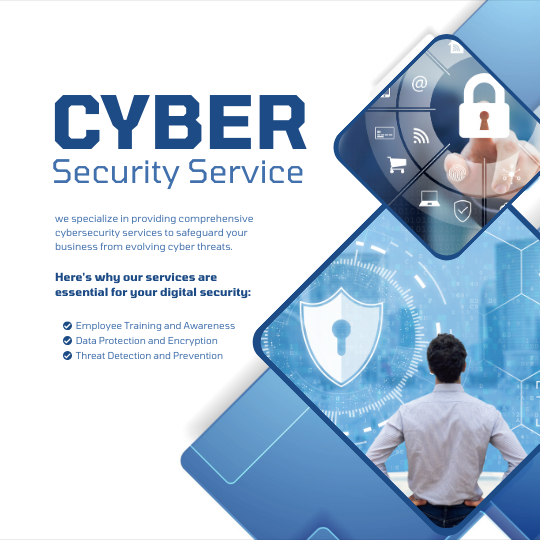Cybersecurity threats are evolving rapidly, and businesses must stay ahead to protect their sensitive data. Cyber-attacks are becoming more sophisticated, targeting businesses of all sizes. This guide will provide the top “Essential Cybersecurity Tips” to help safeguard your business from potential threats, ensuring your data and network remain secure.
1. Educate Your Employees for Essential Cybersecurity Tips
One of the biggest vulnerabilities in any organization is human error. Ensure that all employees are trained to recognize phishing scams, understand password policies, and follow best practices for handling sensitive data.
- Tip: Schedule regular cybersecurity training sessions and provide resources to help employees stay updated.
- Why It’s Important: A well-informed team can significantly reduce the risk of breaches.
2. Use Strong Passwords and Enable Multi-Factor Authentication (MFA)
Weak passwords are an open invitation for hackers. Use complex passwords and enforce multi-factor authentication (MFA) for an added layer of security.
- Tip: Implement a password manager to ensure all passwords are strong and unique.
- Why It’s Important: MFA adds an extra layer of protection, even if passwords are compromised.
3. Keep Software and Systems Updated
Ensure that all your software, including operating systems, browsers, and antivirus programs, are up-to-date. Regular updates fix vulnerabilities that hackers could exploit.
- Tip: Enable automatic updates and conduct regular audits to check for outdated software.
- Why It’s Important: Up-to-date software reduces the risk of vulnerabilities.
4. Backup Your Data Regularly
Data loss can happen due to cyber-attacks, hardware failures, or accidental deletions. Regular backups ensure that your business can recover swiftly in case of data loss.
- Tip: Use a combination of cloud storage and local backups for comprehensive coverage.
- Why It’s Important: Backups ensure your data is safe and can be restored without paying a ransom.
5. Implement a Robust Firewall
Firewalls are the first line of defense against malicious attacks. Invest in a high-quality firewall to block unauthorized access to your network.
- Tip: Use a next-generation firewall with advanced features such as intrusion prevention and deep packet inspection.
- Why It’s Important: A strong firewall protects your network from external threats.
6. Encrypt Sensitive Data
Data encryption ensures that even if data is intercepted, it remains unreadable to unauthorized parties. Use encryption for sensitive emails, files, and communications.
- Tip: Implement end-to-end encryption for emails and secure data storage.
- Why It’s Important: Encryption adds a critical layer of security, especially for sensitive information.
7. Monitor Network Traffic
Regularly monitoring network traffic can help detect unusual activity and potential threats before they escalate. Use network monitoring tools to keep an eye on your infrastructure.
- Tip: Set up alerts for unusual login attempts, spikes in traffic, or any suspicious behavior.
- Why It’s Important: Early detection allows for quicker responses to potential threats.
8. Use Anti-Malware and Antivirus Software
Deploy reliable anti-malware and antivirus software to detect and eliminate malicious threats before they compromise your systems.
- Tip: Schedule regular system scans and update antivirus definitions frequently.
- Why It’s Important: Real-time protection keeps your network secure from malware attacks.
9. Restrict Access to Sensitive Data
Not every employee needs access to all business data. Use access controls to restrict sensitive information to only those who need it for their job.
- Tip: Implement a role-based access control system to limit unnecessary exposure.
- Why It’s Important: Limiting access reduces the potential damage of insider threats.
10. Create a Cybersecurity Incident Response Plan
In the event of a cyber-attack, a well-documented incident response plan can help you act quickly and mitigate damage. Ensure that all employees are familiar with the steps they need to take.
- Tip: Regularly test and update the incident response plan to stay prepared for new threats.
- Why It’s Important: A quick and effective response can minimize damage and speed up recovery.
Conclusion for Essential Cybersecurity Tips
Cybersecurity should be a top priority for businesses . Implementing these tips can help protect your business from ever-evolving cyber threats. Regularly update your security measures, educate your staff, and stay informed about the latest trends in cybersecurity to keep your business secure.


 YAMAHA
YAMAHA SUZUKI
SUZUKI HONDA
HONDA


